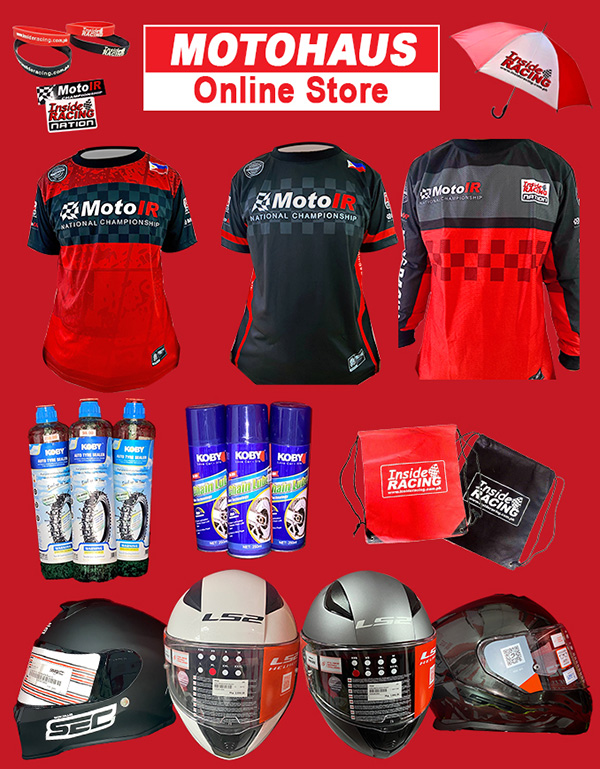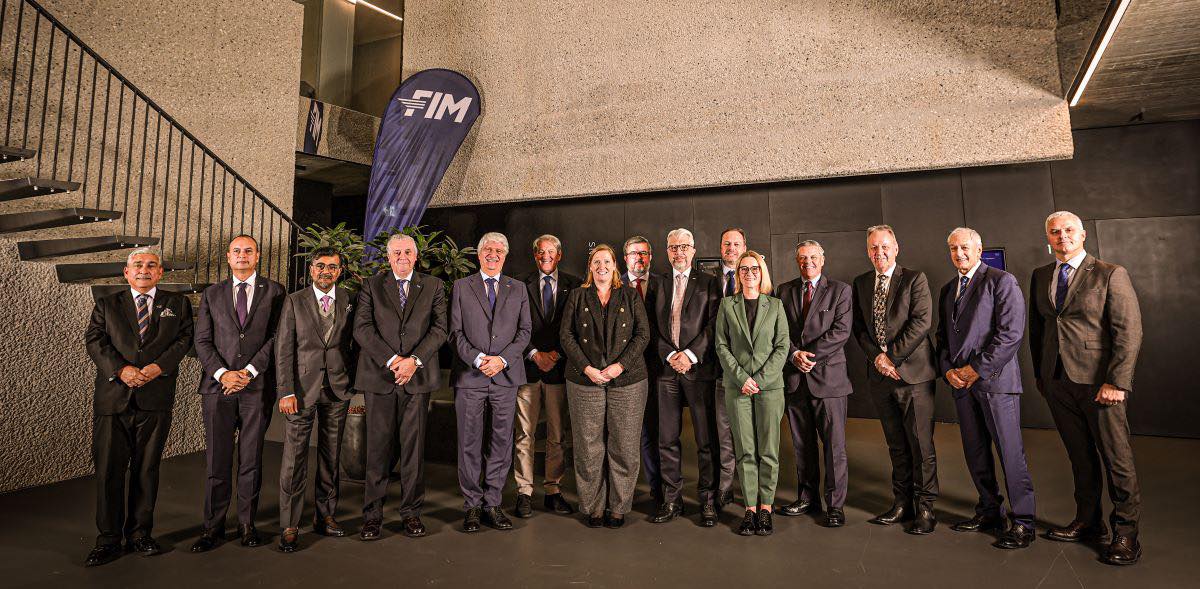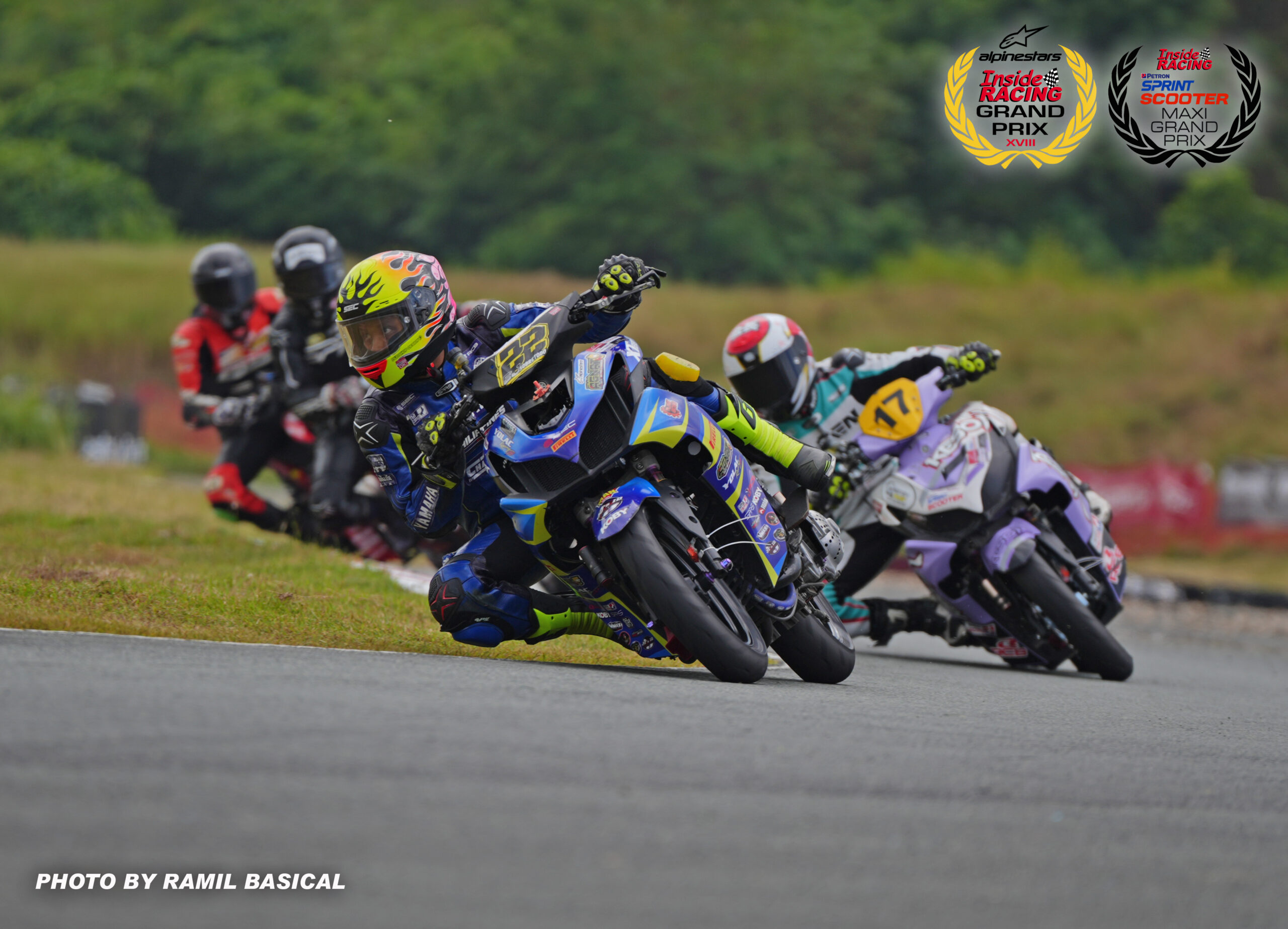New Ducati Panigale V4: wonder engineered
Share this
With the new Panigale V4, Ducati pushes the limits of road super sports bikes even further. Born by profoundly evolving the bike that won the Superbike World Championship for two consecutive years, the new Panigale V4 has undergone a complete rethink in terms of design, technical base and ergonomics. A development that takes full advantage of the benefits deriving from the evolution of tyres, aerodynamics and electronics, thanks also to the experience of Ducati Corse.
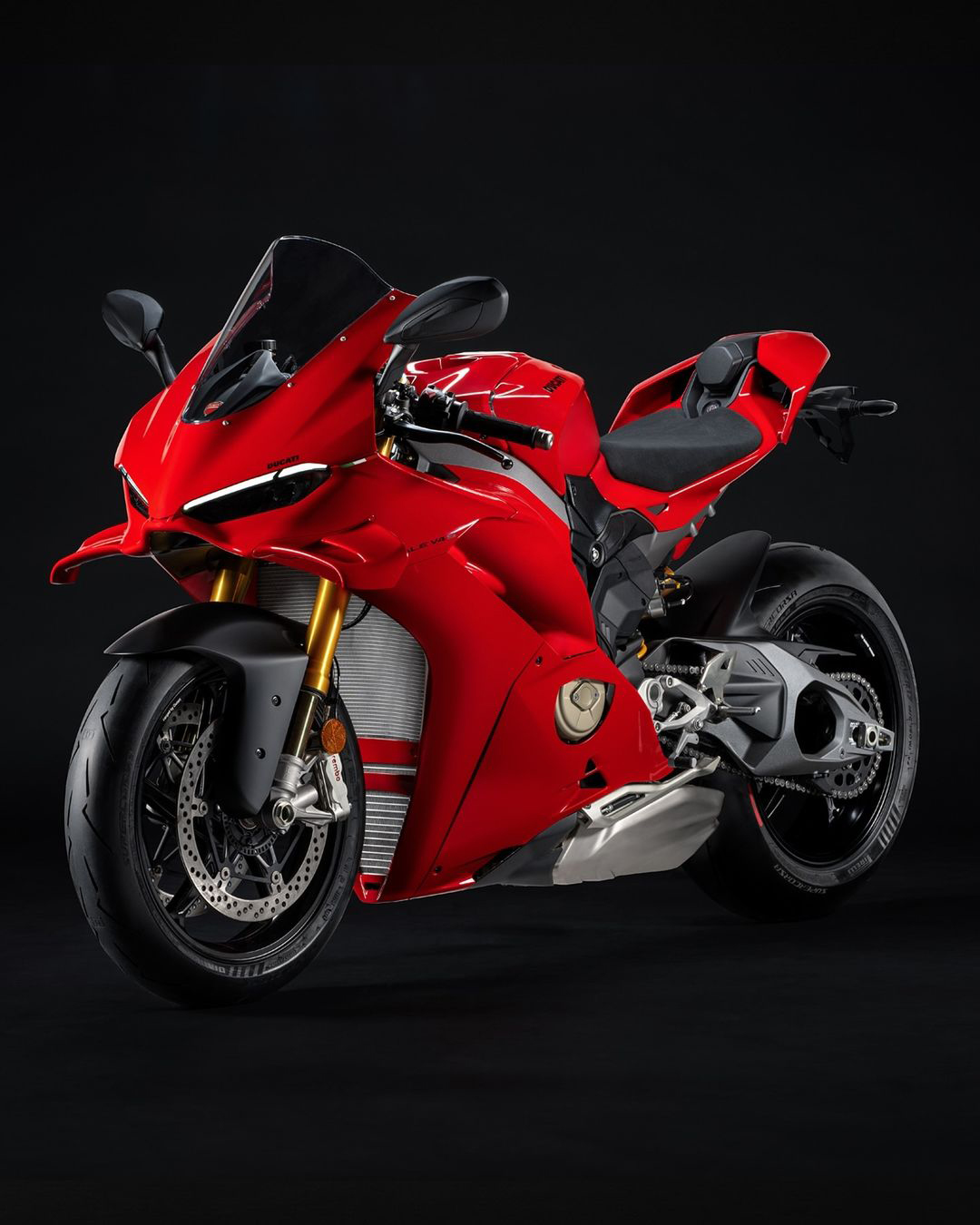
The incessant search for performance, typical of the world of racing competition, has also profoundly influenced the evolution of motorcycle design. In fact, on the new Panigale V4, style and technology are perfectly fused and aimed at the objective of improving performance. A bike that arouses wonder at first glance, a magical and irrational sensation that increases when you get on the saddle thanks to the technical solutions designed by the Ducati engineers.
A true engineered marvel.
“Ducati’s mission is to enrich people’s lives through technologically sophisticated motorcycles characterized by sensual beauty,” declared Claudio Domenicali when presenting the bike during the Ducati World Première. “Few bikes like the new Panigale V4, the seventh generation of Ducati Superbikes, achieve this mission. A motorcycle that continues a history of successes and unforgettable models, and which represents the maximum expression of our values of Style, Sophistication and Performance.”
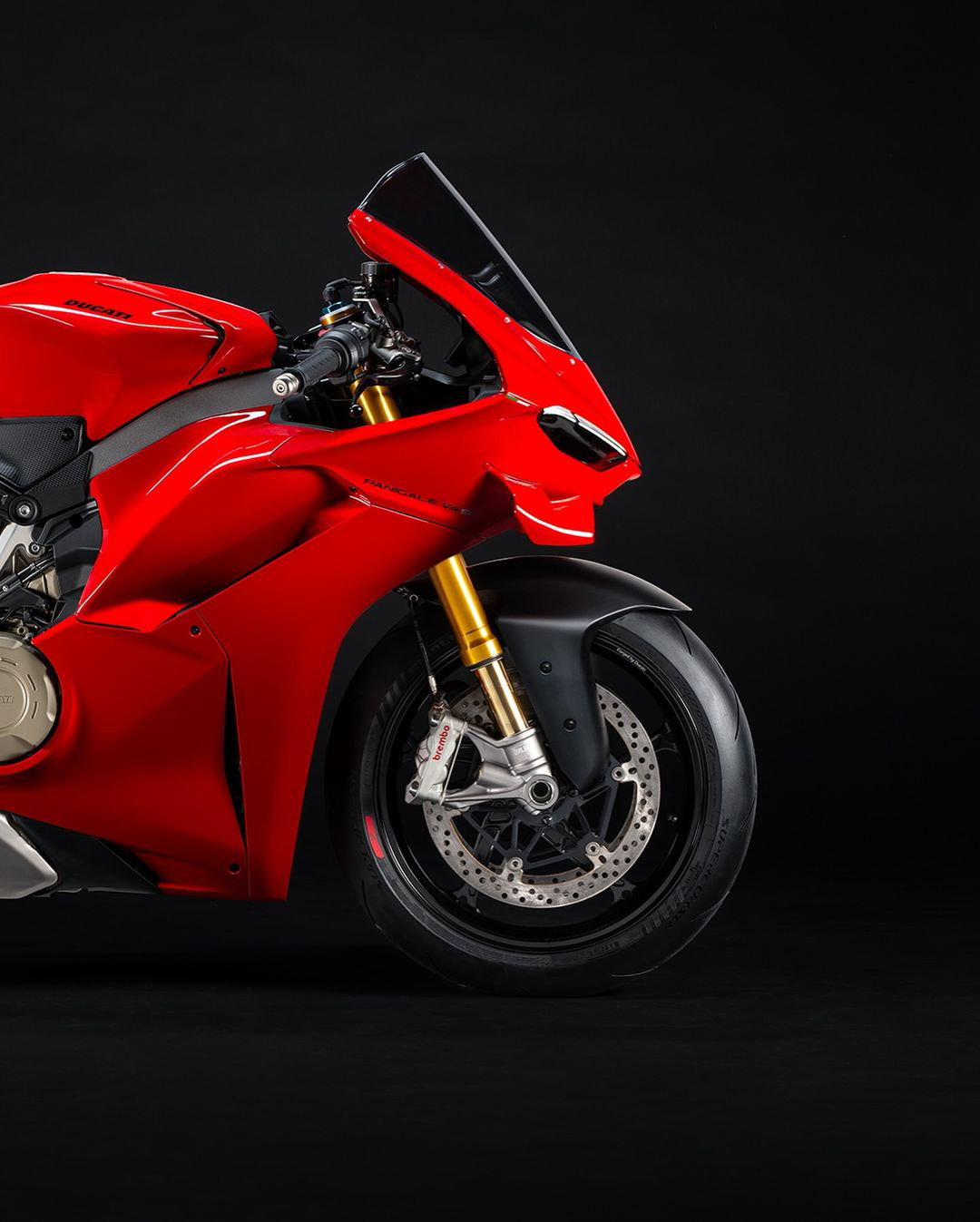
The new Panigale V4 is a motorcycle that allows those who ride it to experience the sensations of a professional rider thanks to unprecedented electronic solutions and technologies, largely derived from MotoGP. Solutions such as its V4 engine with desmodromic distribution and counter-rotating shaft, or chassis and electronics that are even closer to those of the official Desmosedici GPs. A motorbike capable of amplifying the riding skills of its rider, whether professional or amateur, offering him the confidence that allows him to push his limits forward in circuit riding.
A Panigale V4 that follows the evolutionary path traced by Ducati in MotoGP racing competition, where the Desmosedici has become the most desired bike in the category, with which, in 2023, seven out of eight riders were able to win at least one race.
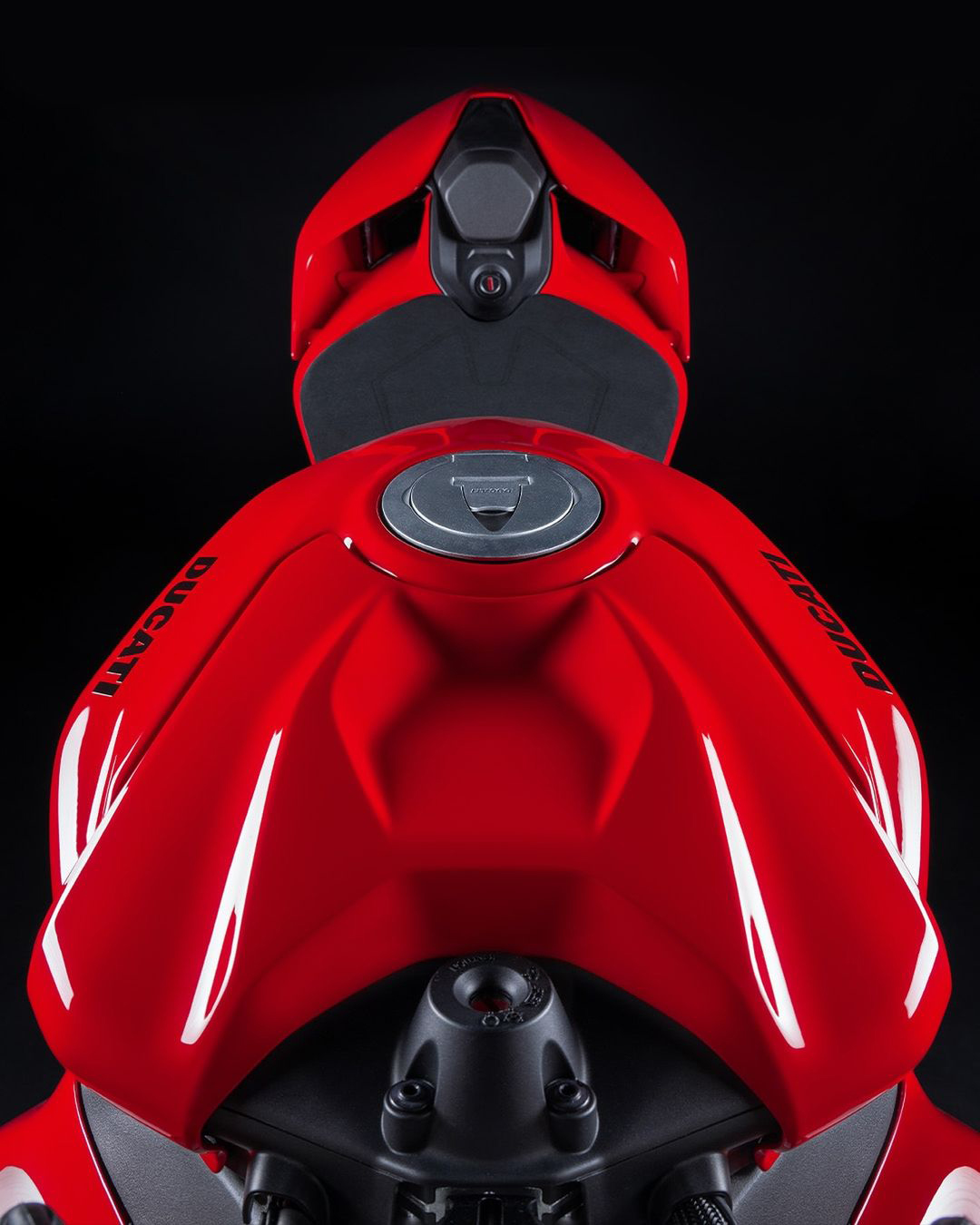
The new Panigale V4 S weighs just 187 kg, two less than the previous model, and gains 0.5 hp despite the more restrictive Euro5+ homologation**. The technological innovations with which it is equipped, combined with these improvements, allowed a panel of riders of different abilities – from the fast amateur to the professional rider – to lower their best time by one full second during a comparative test carried out on the circuit of Cremona.
Integrated aerodynamic design
With the arrival of the seventh generation of Ducati sports bikes, from 851 to today, the development of the Ducati superbike marks an important turning point. From the previous approach, based on an aerodynamic package applied to a motorcycle with an already complete design, Ducati has moved on to a method of aerodynamic design work and integrated design, through a global vision in which the aerodynamic profiles fit seamlessly into the lines of the motorcycle.
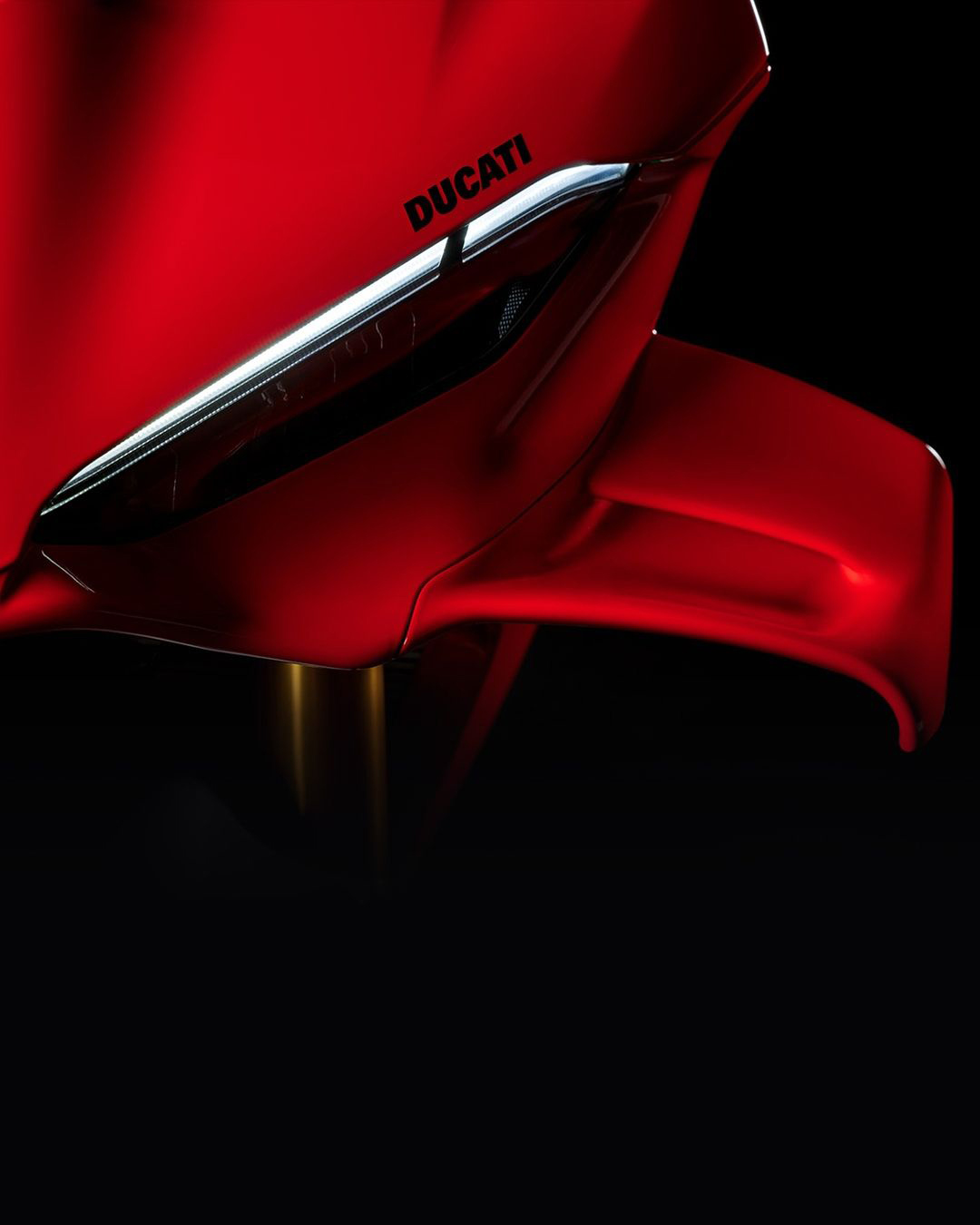
The new fairing reduces aerodynamic resistance by 4% and protects the rider more effectively in a straight line, keeping him in a sort of “bubble” of calm air. The high-efficiency double-profile wings are perfectly integrated with the shapes of the front, maintaining the contribution in terms of downforce unchanged compared to the previous model. Moving back the leading edge of the fairing with respect to the front wheel makes the bike nimbler when changing direction at speed, while the improvement in the shape of the mudguard and the conveyor upstream of the radiators increases the effectiveness of the cooling system, particularly the oil cooler.
To design the new Panigale V4, the Centro Stile Ducati was inspired by the legendary Ducati 916. The designers’ objective was to take inspiration from the iconic motorcycle of the Borgo Panigale company and integrate the ergonomic and aerodynamic solutions of the Desmosedici GP, necessary to satisfy the current riding style on track. The side view of the new Panigale V4 finds that balance between front and rear typical of the 916, with a more horizontal general layout and more like that of the MotoGP bikes of recent years. The unmistakable line of the 916 was also the inspiration for designing the front light cluster, in which the assertive look is underlined by the double V-shaped DRL typical of Borgo Panigale sports bikes. Finally, the air intake is now single and central, hidden under the fairing, while the tail, wider and longer, increases roominess for the rider.
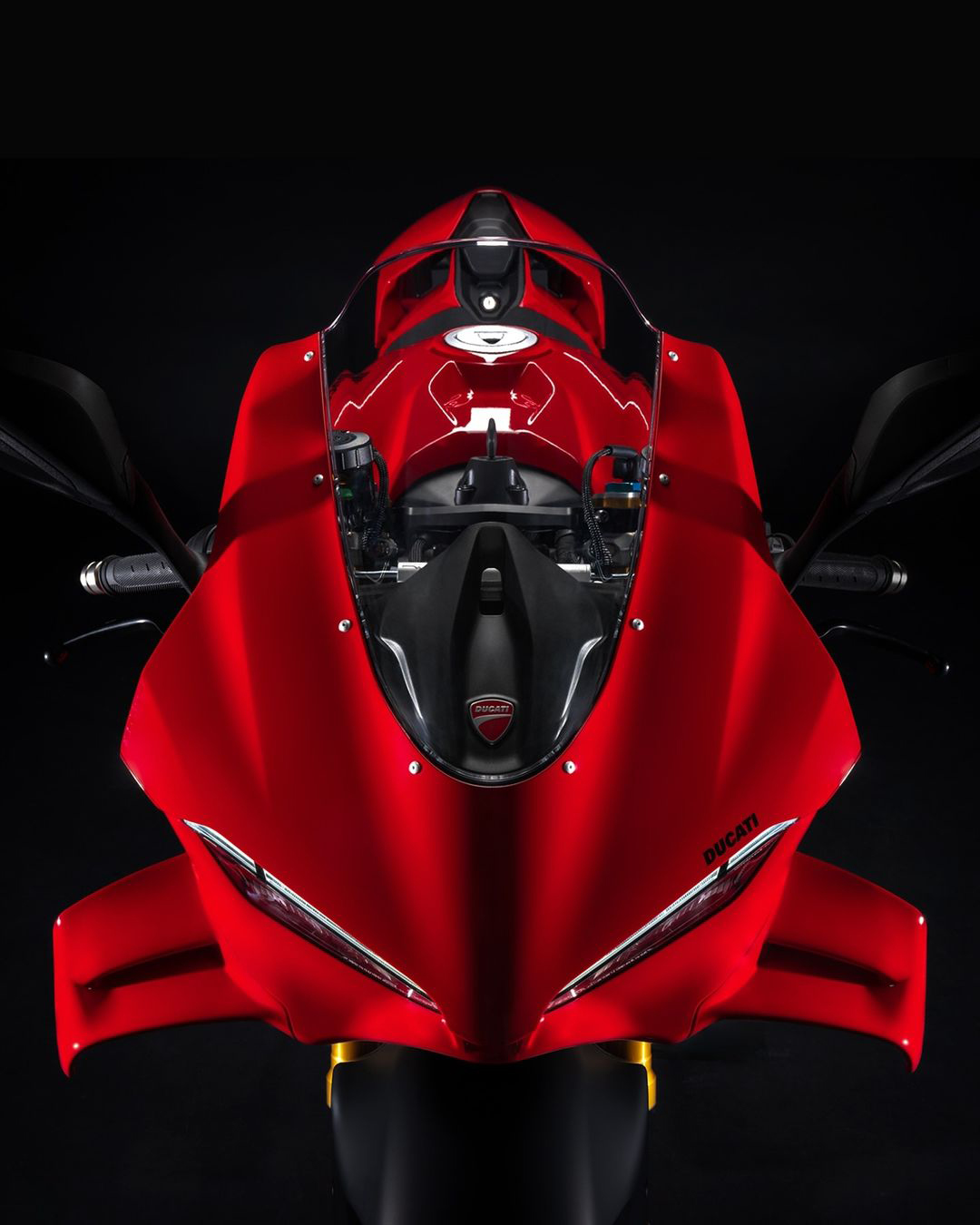
Ergonomics
The riding position of the new Panigale V4 was developed with the dual objective of guaranteeing maximum integration of the rider into the aerodynamics of the motorcycle and improving control of the vehicle in the most important phases of riding on the track. The seat-tank assembly, thanks to greater roominess, offers more freedom of longitudinal movement and facilitates positioning in the fairing, also thanks to a deep recess in the upper part which avoids interference with the chin guard of the helmet.
At the same time, the rear area of the tank, combined with the side covers and the shape of the seat, better support the rider during braking, entering and cornering phases without limiting body movements in the other phases. The rider finds it easier to anchor himself with his knees to counteract the deceleration and to lean out of the saddle once the motorbike is cornering, thus reducing strain on the arms and therefore general fatigue. The footrests have been moved 10 mm inwards compared to the current Panigale V4, increasing ground clearance and, by allowing the rider to have his feet and legs positioned more internally, improving aerodynamic penetration.
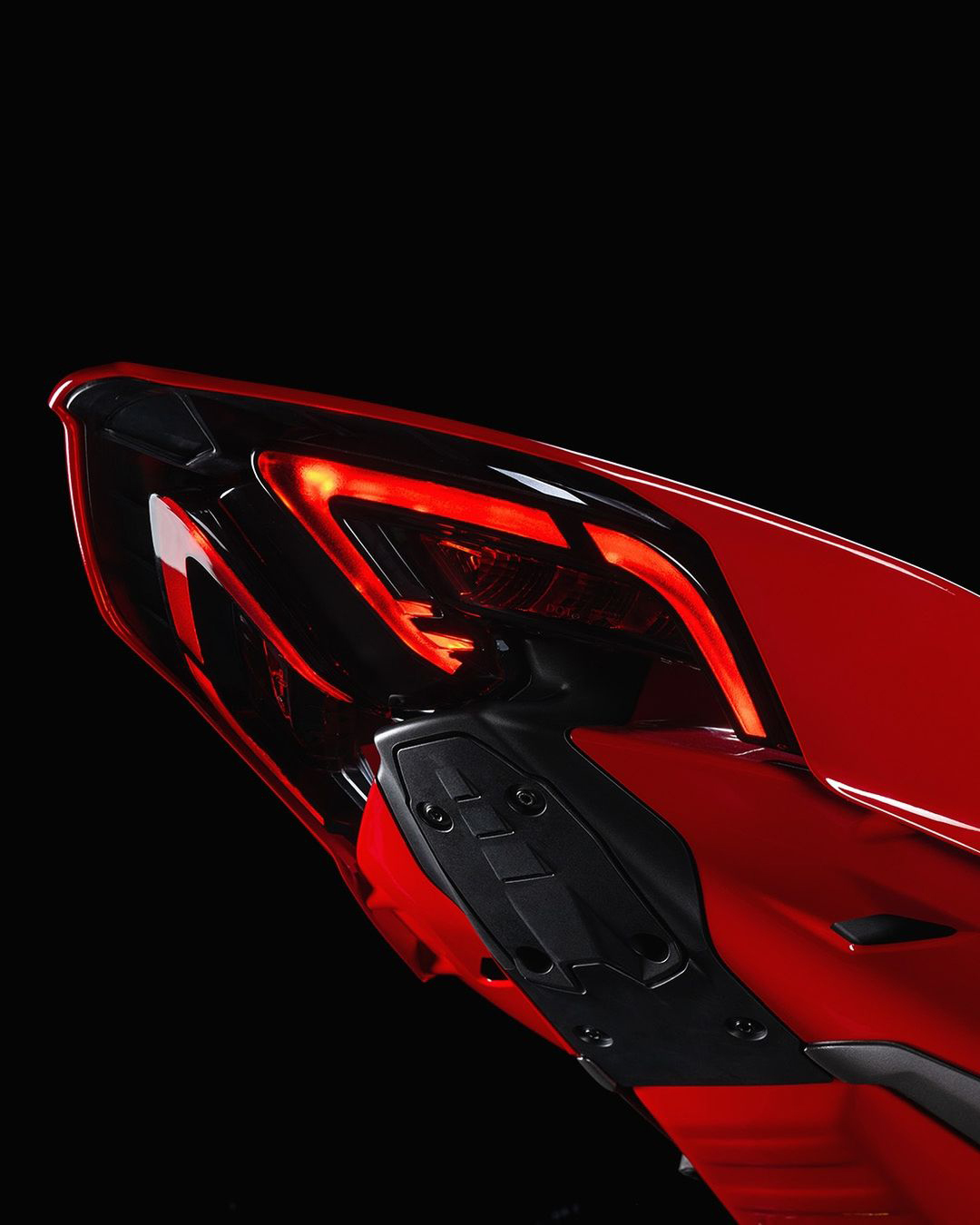
Racing-derived engine
The Panigale V4, more powerful and lighter than the previous model, was created to give enthusiasts unparalleled sensations. Its engine, the Desmosedici Stradale, is strictly derived from that of the Ducati MotoGP bike, with which it shares numerous technical solutions, starting with the architecture. It is a 90° V4 with desmodromic distribution, counter-rotating shaft and Twin Pulse timing, which gives the Panigale V4 a sound totally like that of the Desmosedici GP.
On the Desmosedici Stradale of the new Panigale V4 the distribution diagram has been revised, with cams with a different profile and a higher lift value. The alternator and oil pump are the same as the ones mounted on the Panigale V4 R, while the gearbox drum is the one used on the Superleggera V4. The variable length intake horns have a greater excursion, with a value of 25 mm in the short configuration (-10 mm) and 80 in the long one (+5 mm).
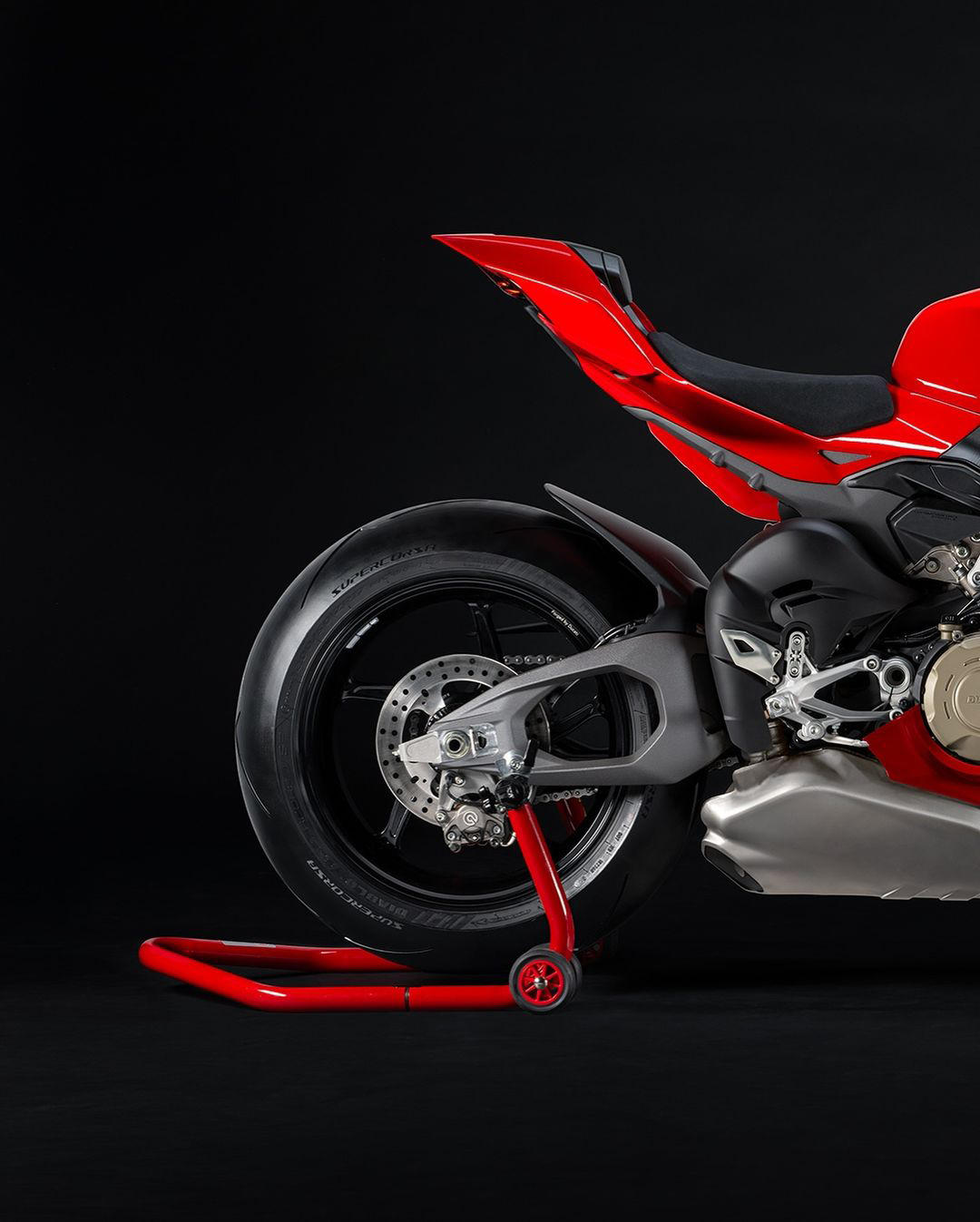
The Desmosedici Stradale engine, Euro5+ homologated, delivers 216 hp at 13,500 rpm and a maximum torque of 12.3 Kgm at 11,250 rpm**. Values that increase in track configuration: by adopting the Ducati Performance racing exhaust by Akrapovič the maximum power rises to 228 hp.
Chassis derived from MotoGP
The Panigale V4 has always been the road supersport bike closest to a MotoGP. In 2022, Francesco Bagnaia recorded a best time of 1m35.8s during the Lenovo Race of Champions, a competition approved by the FMI, on the Misano asphalt. A time less than 4 seconds away from the outright MotoGP race record: 1m31.8s, set by Francesco Bagnaia himself on his Ducati Desmosedici GP.
To make the Panigale V4 even more competitive, Ducati Corse requested new stiffness targets for the frame and swingarm to be able to exploit the full potential of the new slick tyres used in Superbike.
Ducati Corse engineers defined the optimal lateral stiffness to maintain grip at lean angles now over 60°, while at the same time maintaining high longitudinal stiffness values to exploit the engine torque during acceleration and braking power when braking.
For this purpose, the Front Frame was modified and a new double-sided swingarm – Ducati Hollow Symmetrical Swingarm – was developed; lightweight and with an innovative design, thanks to a specific geometry, this allowed the position of the silencer under the engine to be maintained, a unique solution in the global panorama of road super sports bikes. This solution confirms the Ducati approach, based on style, sophistication and performance, capable of overcoming the compromise between style and performance.
The new swingarm reduces lateral stiffness (-37% compared to the previous single-sided swingarm) and weight thanks to the two large lightening slots, improving traction when exiting corners and the rider’s feeling during acceleration. The swingarm-forged rear rim assembly weighs 2.7 kg less than the previous one and is more effective in putting power to the ground. On the Panigale V4 S, the forged aluminium alloy wheels with five tangential spokes, inspired by those of the Desmosedici GP, weigh only 2.95 and 4.15 kg for the front and rear respectively.
The Front Frame is lighter (3.47 kg compared to the previous 4.2) and has been remodulated in terms of stiffness compared to the previous model (-40% laterally). As a result, it offers even more confidence when leaning and is more effective when it comes to taking the apex and closing the turn. The third generation electronically controlled Öhlins NPX/TTX suspensions of the Panigale V4 S broaden their range of adjustments, offering more comfortable settings for road use and are more effective when riding between the curbs of a circuit. At the same time, the greater speed of the hydraulic valves offers a more precise and accurate response in every riding situation.
The new Ducati Panigale V4 is the first motorcycle in the world equipped with Brembo HypureTM front brake callipers. Lighter (-60 grams per pair) and more high performing, the Brembo HypureTM callipers disperse the heat generated by braking more effectively, offering more consistent performance, and therefore greater effectiveness for the rider in seeking his own limits. Another important world premiere is the Race eCBS system, developed by Bosch in collaboration with Ducati. In the levels dedicated to circuit use, the latter can activate the rear brake according to strategies that reproduce the techniques of professional riders and therefore experiment with the possibility of delaying the braking point on the track compared to the absence of the system. In particular, the system continues to activate the rear brake even after releasing the front brake when entering and cornering, as professionals manage to do using the handlebar control.
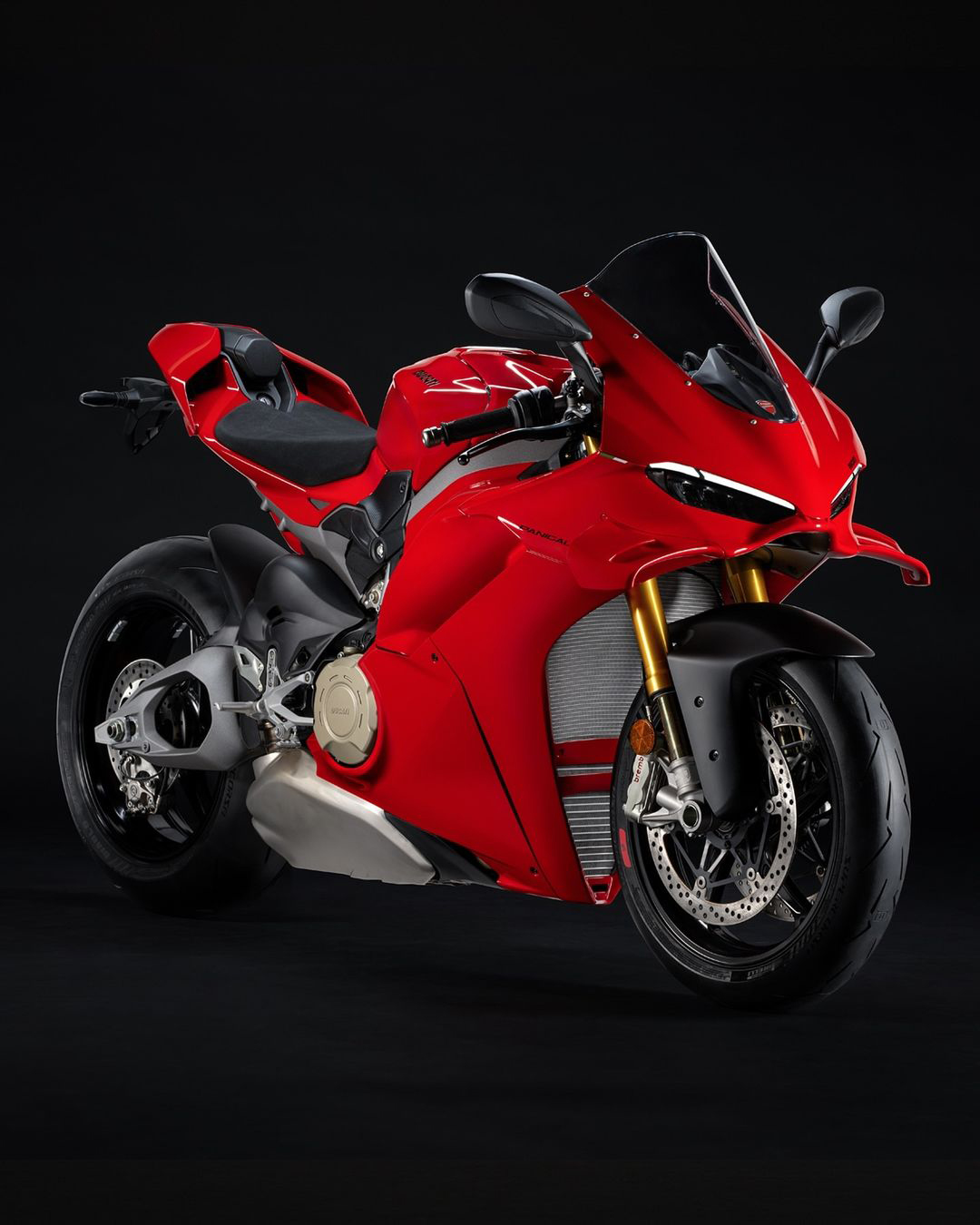
Ducati Vehicle Observer
The constant commitment to electronic innovation led Ducati to develop the Vehicle Observer (DVO). The Ducati Vehicle Observer simulates the input of over 70 sensors, thus refining the electronic control strategies, which can achieve unprecedented effectiveness in series production. The extreme precision of this functionality in fact allows the controls to intervene in an almost predictive manner to promptly satisfy the rider’s requests in the search for maximum performance.
The DVO, developed by Ducati Corse in MotoGP, estimates the ground forces acting on the motorcycle and the loads that it can bear in various riding conditions, integrating the information from the IMU inertial platform in an even more accurate manner.
The 2025 Panigale V4 is equipped with a complete package of electronic controls: Ducati Traction Control DVO, Ducati Slide Control, Ducati Wheelie Control DVO, Ducati Power Launch DVO, Engine Brake Control and Ducati Quick Shift 2.0. The DQS 2.0 system uses a strategy based solely on the angular position sensor of the gear drum, thus being able to use a gear shift rod without microswitches and therefore offering the rider a more direct feeling with reduced travel.
MotoGP dashboard
The dashboard is completely new. The dimension of 6.9″ with an 8:3 aspect ratio offers maximum readability without interfering with vision through the windshield in the fairing position. The protective glass uses Optical Bonding technology to ensure optimal readability on a black background even during the day.
On the new Panigale V4, the sensation of being on a Desmosedici GP is reinforced by the new Track display on the dashboard. The interface dedicated to use on the track is in fact designed to support the rider in the search for maximum performance. Thanks to the size and “wide” form factor of the new dashboard, a series of new parameters can be displayed on one side of the screen:
- “g-Meter”, which indicates in real time the value of lateral acceleration when leaning, and longitudinally during acceleration and braking.
- “Power&Torque”, which displays the percentage of power and torque delivered at that moment compared to the maximum values available given the gear engaged.
- “Lean angle”, which shows the instantaneous lean angles accompanied by the level of throttle opening and the pressure exerted on the brake.
The Info Mode Track can display chronological performance in real time. Taking advantage of the GPS system, the dashboard displays lap times, and is capable of handling three splits, which can be set by the rider using the flash button during the first session. The dashboard displays the split times table, with T1, T2, or T3 icons indicating the performance obtained in that sector of the track using the same colour codes – white, grey, orange, red – used in MotoGP.
The Road info mode is very clean, with great prominence given to the circular tachometer, placed in the centre and with the gear indicator inside. The left side of the screen is reserved for settings, the navigator (if installed), the music player, smartphone management and accessory heated grips, and the different functions available for each of these. On the right-hand side are the indications for speed, time, water temperature and cruise control, if enabled. The dashboard dynamically changes the distribution of space, moving the columns and redistributing the areas, to offer maximum visibility to the functions you are currently using, such as the navigator.
Upon returning to the pits, the new DDL data acquisition completes the official rider experience. The system, developed by 2D in collaboration with Ducati, records all the parameters relevant for riding from the Panigale’s CAN bus line, cross-referencing them with a state-of-the-art GPS system capable of drawing the trajectories travelled with great precision. The data can then be analysed using external software with templates and reports created by Ducati Corse, to perfect your performance on the track.
The new Panigale V4, offered in single-seater configuration with a passenger kit available as an accessory*, will arrive in dealerships in September 2024.
#DucatiWorldPremiere2025 #Ducati2025 #wonderengineered
* Bike specifications and equipment may vary from market to market. Please refer to your local dealer for further information
** Not valid for USA – power differs from the EU homologated version
Panigale V4 S
Colour
- Ducati Red with Urban Grey frame, black rims and matt black front mudguard
- Main standard equipment
- Desmosedici Stradale engine, 1,103 cc
- Maximum power of 216 hp at 13,500 rpm (209 hp @ 12,750 rpm for the US market)
- Maximum torque of 12.3 kgm at 11,250 rpm (121,3 Nm @ 11250rpm for the US market)
- Curb weight without fuel: 187 kg
- “Front Frame” chassis
- 17-litre aluminium tank
- Ducati Electronic Suspension (DES) 3.0
- Öhlins NPX-30 fork with Öhlins Smart EC 3.0 control system
- Öhlins TTX 36 shock absorber with Öhlins Smart EC 3.0 control system
- Öhlins steering damper with Öhlins Smart EC 3.0 control system
- Forged aluminium rims
- Lithium battery
- Braking system with Brembo HypureTM monobloc callipers
- Pirelli Diablo Supercorsa V4 tyres with 200/60 rear
- Wings with biplane configuration and integrated design
- Latest generation electronic package with 6-axis Inertial Measurement Unit (6D IMU): Race eCBS with cornering functionality; Ducati Traction Control (DTC) DVO; Ducati Slide Control (DSC); Ducati Wheelie Control (DWC) DVO; Ducati Power Launch (DPL) DVO; Ducati Quick Shift (DQS) 2.0; Engine Brake Control (EBC), Ducati Vehicle Observer (DVO)
- Buttons for quickly changing levels
- New 6.9” full-TFT dashboard with 8:3 aspect ratio
- Riding Modes (Race A, Race B, Sport, Road, Wet)
- Full-LED headlights with DRL and turn signals integrated into the headlight*
- Single-seat configuration (passenger kit accessory)
- Ready for Ducati Data Logger (DDL) and Ducati Multimedia System (DMS)
Panigale V4
Colour
- Ducati Red with Urban Grey frame and black rims
Standard equipment like Panigale V4 S except for:
Colour
- Curb weight without fuel: 191 kg
- 43 mm Showa Big Piston Fork (BPF), fully adjustable
- Sachs mono-shock absorber, fully adjustable
- Sachs steering damper
- Five-spoke light alloy wheels
- Lead acid battery
credit: Ducati
Thank you for visiting insideracing.com.ph. While you are here, kindly don’t forget to click on our advertiser ads above, visit their site and consider them for your motorcycling needs. It will help us a lot.
You can also order a copy of our monthly print magazine for more riding contents to read and enjoy at your leisure anytime by clicking here.
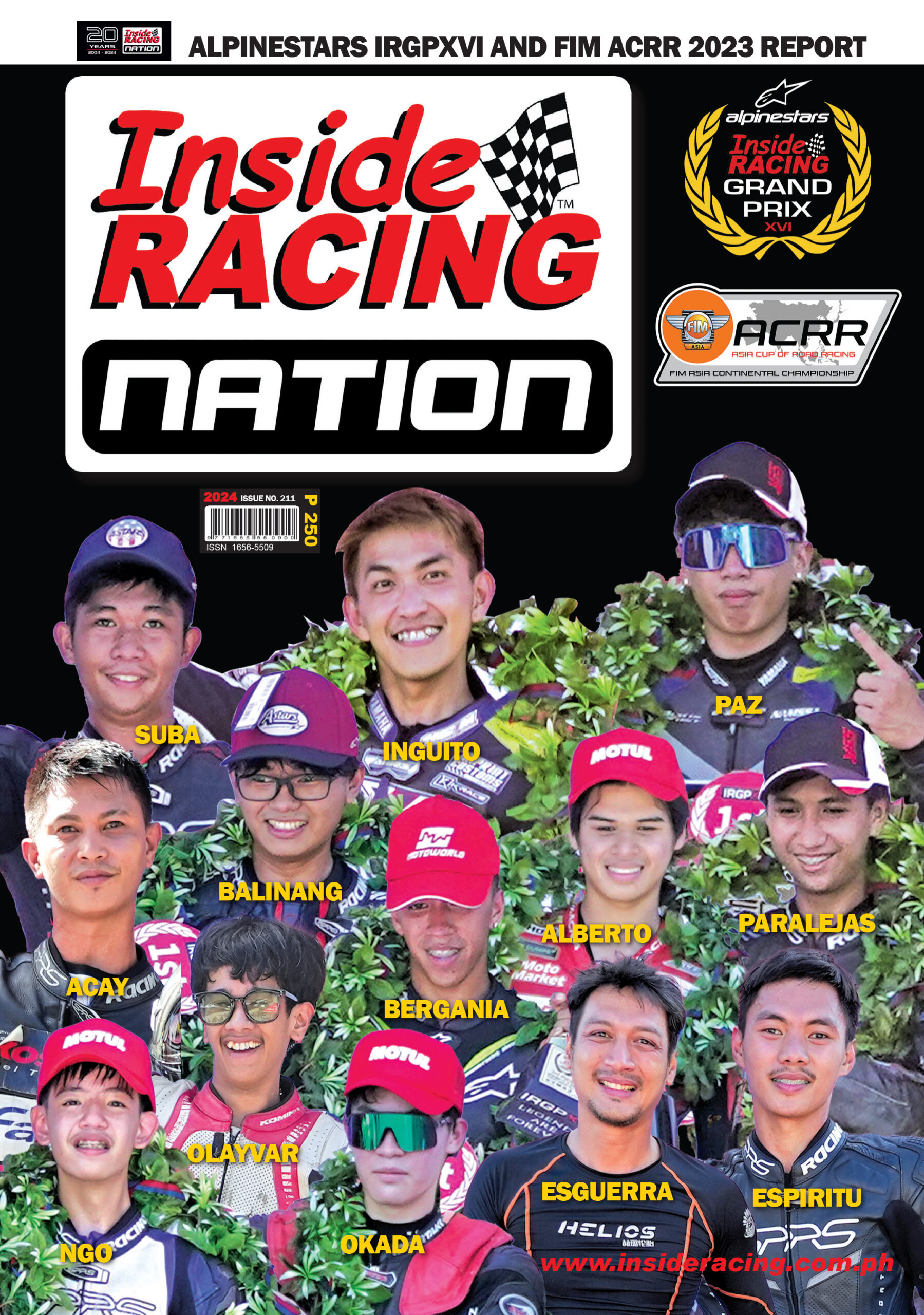
You may also express your thought below through the comment section. You may also follow us on Facebook, on Instagram @Insideracingnation or subscribe to our YouTube channel.









